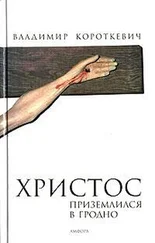“You lie. People kill others, not themselves. I don't believe in it, I've never experienced it, which means that it doesn't exist. I don't wish to kiss anybody, about which your books write so much and so queerly, — people bite each other.”
Even now such talk frightens some men, what then is there to say about those times? I am not an unfeeling sort of person, but I felt no shame: she spoke about love as other women do about the weather. She did not know it, she had not been awakened, was quite cold, cold as ice. She could not even understand whether it was shameful or not. And her eyes looked frankly into mine.
This could not have been coquetry. This was a child, not a child even, but a living corpse.
She wrapped her shawl about her and said:
“Death reigns on earth. That I know. I don't like it when people lie about what has never existed on our earth.”
Beyond the walls the wind howled. She shrugged her shoulders and said quietly:
“A terrible land, terrible trees, terrible nights.”
And again I saw that same expression on her face and did not understand it.
“Tell me, they are large cities — Vilnia and Miensk?”
“Rather large, but Moscow and Petersburg are larger.”
“And there, too, the nights bring no comfort to people?”
“Not at all. In the windows lights burn, in the streets people laugh, skates ring, street lamps shine.”
She became thoughtful.
“That's so there. But here not a single light. Surrounding this old park two versts on every side, lonely huts are asleep, sleeping without any lights. In this house there are about fifty rooms, many corridors and passages with dark corners. It was built so long ago... And it is a cold house, for our ancestors forbade laying stoves, they allowed only fireplaces in order to be unlike their common neighbours. The fireplaces burn day and night, but even so there is dampness in the corners and cold everywhere. And in these fifty rooms there are only three people. The housekeeper sleeps on the ground floor and the watchman also. And in one of the wings behind the alleys and the park the cook and the washerwoman live. They live well. And in the second annex to this house, with its separate entrance, my manager lives, Ihnat Bierman-Hacevič. Whatever we need this manager for, I do not know, but such is the law. And in this house, on the entire first floor with its 30 rooms, I am the only one. And it is so uncomfortable here that I'd like to get into some corner, wrap myself up in my blanket as a child does, and sit there. Now for some reason or other it feels good and so quiet here as it has not been for two years, since the time my father died. And it is all the same to me now whether there are lights beyond these windows or not. You know, it is very good when there are people beside you...”
She led me to my room (her room was only two doors away) and when I had already opened the door, she said:
“If old legends and traditions interest you, look for them in the library, in the book-case for manuscripts. A volume of legends about our family must be there. And some other papers as well.”
And she added: “Thank you, Mr. Biełarecki.”
I don't know why she thanked me, and I confess that I didn't think about it much when I entered a small room without any door-bolts, arid put my candle on the table.
There was a bed there as wide as the Kojdanava Battlefield. Over the bed was an old canopy. On the floor a threadbare carpet that had been a wonderful piece of work. The bed, evidently, was made up with the help of a special stick (as they used to do 200 years ago), and such a big stick it was. The stick stood near the bed. Besides the bed there were a chest of drawers, a high writing-desk and a table. Nothing else.
I undressed, lay down under a warm blanket, having put out the candle. And immediately beyond the window the black silhouettes of the trees appeared on a blue background, and sounds were heard, sounds evoking dreams.
For some reason or other a feeling of abandonment overcame me to such a degree that I stretched out, drew my hands over my head and, almost beginning to laugh, so happy did I feel, I fell asleep, as if I had fallen into some kind of a dark abyss over a precipice. It seemed to me I was dreaming that someone was making short and careful steps along the corridor, but I paid no attention to that, and I slept and in my dream I was glad that I was asleep.
This was my first night and the only peaceful one in the house of the Janoŭskis at Marsh Firs.
The abandoned park, wild and blackened by age and moisture, was disturbed for many acres around, filled with the noise of an autumn rain.
The following day was a usual grey day, one of those that often occur in Belarus in autumn. In the morning I did not see the mistress of the house. I was told that she slept badly at night and therefore got up late. The housekeeper's face, when I was having breakfast, was a kind of vinegar-sour face and so sulky and haughty, it was unpleasant to look at her. Therefore I did not stay long at table, took my tattered notebook, five pencils, put on my cloak that had dried overnight, and having asked the way, set off for the nearest “pachynak” — one or two huts in a forest, the beginning of a future village.
I immediately felt better, although nothing in the surroundings made for merriness. Only from here, from this wet footpath, could I take a good look at the castle. At night it had seemed smaller to me, for both of its wings were safely hidden in the thicket of the park and the entire ground floor was completely overgrown with lilac that had grown wild. And beneath the lilac grew yellow dahlias, pulpy burdock, dead-nettle and other rubbish. Here and there as in all very damp places, greater celandine stuck out its web-footed stalks, sweetbriar and solanum grew wild. And on the damp earth amidst the various herbs lay branches white with mould, broken off, apparently by the wind.
Traces of the work of human hands were seen only in front of the entrance where late dark purple asters shone in a large flower bed. And the house looked so gloomy and cold that it wrung my heart. It was a two-storeyed building with an enormous belvedere, and along the sides were turrets, though not very large ones. Striking was the lack of architecture characteristic of the magnificent buildings of those days when our ancestors ceased building castles, but nevertheless demanded that their architects should erect mansions resembling this moss-overgrown old lair.
I decided to go to the farmstead only after I had examined everything here, and I continued along the lane. The devil alone knows what kind of a fool had thought of planting fir trees in such a gloomy place, but it had been done, and the park which must have been hundreds of years old was only a little pleasanter than Dante's famous forest. The firs were so thick that two persons together could not have encircled them with their arms, and they approached the very walls of the castle, their branches looking into the windows, their blue-green tops rising above the roof. Their trunks were covered by a grey border of moss and lichen, the lower branches hung down to the earth like tents, and the alleyway reminded one of a narrow path between hills. It was only near the very house that here and there could be seen gigantic, gloomy almost bare linden trees, dark from the rain, and one thick-set oak, evidently well looked-after, for its top was several metres higher than those of the tallest firs.
My feet stepped noiselessly along the coniferous path. Smoke came from the left and I went in the direction of the smell. Soon the trees were not so dense and an overgrown wing with boarded-up windows came into view.
“About half a verst from the castle,” I thought. “If, let's say, someone took it into his head to kill the owners — nobody would hear anything, even if a gun were fired.”
Читать дальше



